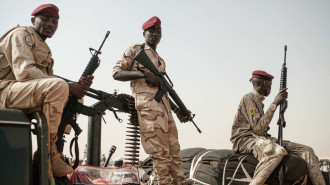How Israel wages psychological warfare on Lebanon
As Israel and Hezbollah have ramped up attacks across the Lebanese border and the possibility of a full-blown war is closer than ever, the 'psychological warfare' between the two warring parties has also heated up.
From Israeli threats of deploying "never used before" weaponry to government officials promising to "turn Beirut into Gaza", Israel has been waging a psychological war against Lebanon throughout the past eight months, and long before.
The Lebanese Shia Muslim group, allied with Hamas in Gaza and supported by Iran, has vowed to continue striking Israeli assets for as long as Israel wages war in Gaza.
Israel's Prime Minister Benjamin Netanyahu on Sunday revealed that troops would soon be moved to Israel's northern frontier with Lebanon for "defensive purposes" as the Rafah invasion wound down, and reiterated his aim to ensure Israeli civilians can return to border towns.
'New weapons' threats
Netanyahu’s remarks coincided with a report from Israeli broadcaster Channel 12 on Sunday which said that Israel told the US it had intended to use "unspecified new weapons systems" in a conflict with Hezbollah.
Israel's military spokesperson said last week that it had "approved and validated" operational plans for an offensive in Lebanon, making the most explicit comment in regards to an imminent war.
For its part, Hezbollah has unveiled new weaponry and strategy in recent weeks, including a surface-to-air missile which successfully forced an Israeli fighter jet to retreat, marking the first time the group impacted Israel’s air force.
Hezbollah leader Hassan Nasrallah in a speech last week said his fighters were ready for an invasion and even claimed that militants from other Middle Eastern and Asian nations were willing to join its fight against Israel.
Over the past ten days, it has released two videos disclosing drone monitoring of Israeli assets, including the port of Haifa, and its ability to infiltrate Israel’s air defence system unnoticed.
Returning Lebanon to 'the Stone Age'
Senior members of Israel's government have used inflammatory rhetoric to call for a greater military escalation against Hezbollah and have called for the occupation of south Lebanon.
Far-right National Security Minister Itamar Ben-Gvir, who has called for Palestinians to leave Gaza, called for Hezbollah "strongholds" to be burned in comments earlier this month.
"They’re burning [us] here. All Hezbollah strongholds should be burned, they should be destroyed. War!" Ben-Gvir said.
Last August, two months before the Gaza war broke out, Defence Minister Yoav Gallant during a trip to the border said that if a conflict developed, Israel would “return Lebanon to the Stone Age".
Earlier this month, far-right Finance Minister Bezalel Smotrich called on Gallant's threat to materialise.
Criticising Israel’s war cabinet of which he is not a member, Smotrich wrote on X that "A year ago, the defense minister said that we will send Lebanon back to the Stone Age. Mr. Prime Minister, Mr. Defense Minister, Mr. Chief of Staff: That time has come".
Meanwhile, Netanyahu said Beirut and southern Lebanon would be turned into "Gaza and Khan Younis" if Hezbollah "chooses to start an all-out war".
The bellicose rhetoric prompted the UN Secretary-General Antonio Guterres to say that "the world cannot afford Lebanon to become another Gaza".
International law violations
Israel has been accused of breaching international laws on conflict by deploying white phosphorus, an incendiary toxic substance, munitions in populated areas in southern Lebanon.
Just on Monday, videos shared online by Lebanese users showed streams of white smoke falling on hills in the night-time. Phosphorus bombs leave distinct white smoke streaks through the sky.
Experts have warned that Israel’s actions will cause long-term environmental damage, as well as being a serious threat to civilian safety.
Only Israel is allowed to drop white phosphorus bombs on civilian areas in both Lebanon and Palestine, nearly every single day, and the international community won’t even blink. pic.twitter.com/RUsaBUlfv6
— sarah (@sahouraxo) June 23, 2024
Human Rights Watch verified the use of the substance in at least 17 municipalities in the south by Israeli forces since October.
Early on in the fighting, a Lebanese journalist was killed and six others injured by an Israeli tank while they were reporting on the cross-border shelling near the village of Alma al-Chaab.
A UN investigation in March confirmed that an Israeli tank had fired a round at the group of journalists and found that there had been no exchange of fire for 40 minutes prior to the Israeli tank strikes.
Echoes of 2006
In the summer of 2006, Israel and Hezbollah waged a 34-day war which saw swathes of Beirut’s southern suburbs destroyed by Israeli air strikes and portions of the south torn up.
International investigations on the conflict later found that Israel deployed millions of cluster munitions across south Lebanon in the final three days of the war, peppering the landscape and villages with dangerous unexploded ordnance.
Cluster bombs are not illegal under international laws of war, but the ferocity with which Israel used them during that conflict led the UN and campaigners to call for their ban.







 Follow the Middle East's top stories in English at The New Arab on Google News
Follow the Middle East's top stories in English at The New Arab on Google News
![Lebanon after strikes [Getty]](/sites/default/files/styles/image_330x185/public/2184409977.jpeg?h=a5f2f23a&itok=7wpfQMyI)
![G20 Brazil [Getty]](/sites/default/files/styles/image_330x185/public/2184389194.jpeg?h=a5f2f23a&itok=t1DchCMY)
